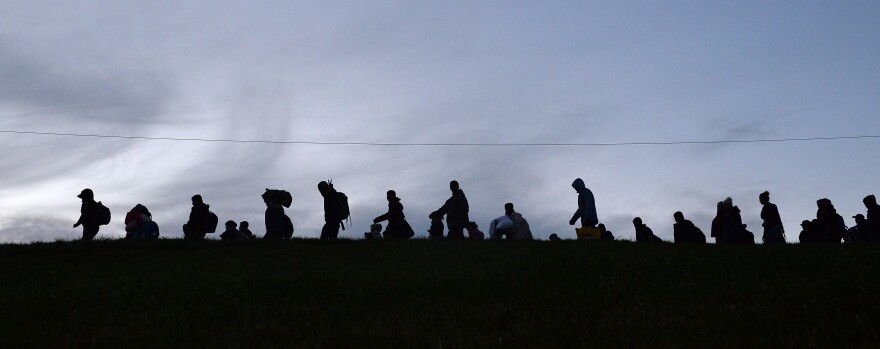Germany and Poland may not share a common language or currency, but they do share an open border.
Both are among the 26 European nations in what's known as the Schengen Area, and getting from one to the other is as simple as crossing a bridge over the Oder River by car or on foot.
No one has asked to see passports at this border crossing, 60 miles east of Berlin, since Poland joined the European Union in 2004. Nor does anyone check to see whether travelers are obeying custom rules.
But the arrival of thousands of migrants daily in Europe's Schengen countries has many European governments complaining the open-border policy is being abused.
A few leaders, like Hungarian Prime Minister Viktor Orban, have erected fences or otherwise sealed their borders with fellow EU states in protest. On Wednesday, Austria and Slovenia announced their own plans to build fences along parts of their borders.
One of dozens of Germans walking to the Polish side on a recent chilly morning is Stefan Rohde, 55, from Berlin.
"Isn't it wonderful? I think it's great we can move so freely," he says.
Prices are far cheaper in Poland, so Rohde crosses the river to the Polish town of Slubice once a month to buy cigarettes and other items for his elderly neighbors.
Fellow Berlin resident Manuela Bayer also shops in Slubice. She says that was a lot harder to do during the Communist era, even though East Germany and Poland were allies. She says back then, she had to wait 45 minutes for surly border guards to check her passport.
Bayer says it would be ridiculous to introduce such border controls between the countries now.
More Calls For Border Checks
But most Germans on the bridge this day tell me they'd welcome renewed border checks. One is Burkhard, 56, from Frankfurt-an-der-Oder on the German side of the bridge, who refuses to give his last name.
He complains about thieves and vandals he says come to his town from Poland. He says border abuses are even worse in southern Germany, where many migrants have been arriving.
While member countries are allowed to close internal Schengen borders temporarily, senior European leaders criticize what's happening now as self-serving and warn it could cause lasting damage to the EU bloc.
Pierre Vimont of Carnegie Europe is an adviser to EU President Donald Tusk. Vimont says he doubts European countries could get rid of their open borders permanently even if they want to.
"It's not all that sure that we would be able to manage the way we used to, 20 or 30 years ago," he says. "Now we have so much in common trade, industry, that if we go back to national domestic borders, it would be a total new landscape and we would need to find totally new ways of managing these borders."
For now, European leaders of the Schengen countries appear eager to keep their open-border arrangement. Those who attended an emergency summit in Brussels last weekend agreed to increase funding and send police to improve controls on the zone's external borders.
Copyright 2021 NPR. To see more, visit https://www.npr.org.



